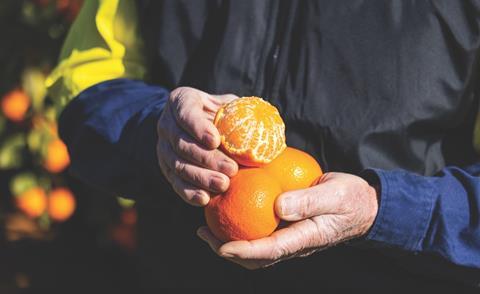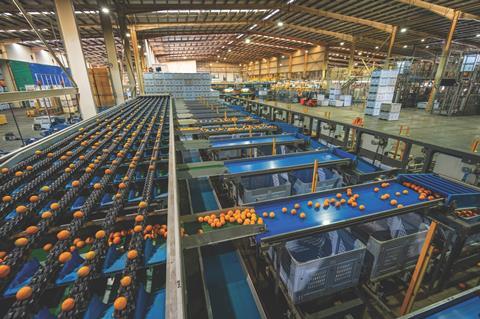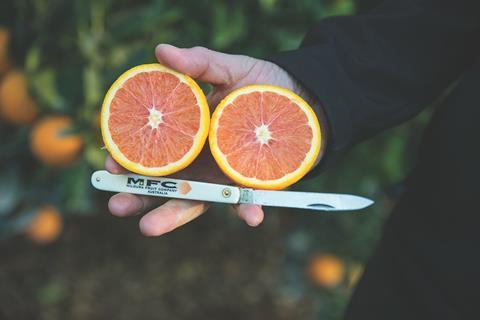GM of the Australian citrus heavyweight Grant Leyden outlines plans to boost supply, add capacity and pursue branded varieties in a bid to grow “bigger and better” than ever

Mildura Fruit Company (MFC) began operating over 100 years ago and is now one of Australia’s largest citrus packer-marketers. The Sunraysia cooperative works with more than 120 growers, supplying Australian citrus both domestically and internationally, exporting to over 30 markets mainly in Asia and North America.
In 2023, after 20 years in the role, Perry Hill, MFC’s longest-serving general manager, resigned and the company ushered in Grant Leyden – former general manager of Mildura-based Sunbeam Foods.
“A key reason I joined was that I really bought into the ten-year plan that Perry and the team had set the year prior,” Leyden says.
While Leyden notes much of the plan will unfold internally, there will be some noticeable external changes over the years. One of these was the recent acquisition of the Pacific Fresh packing operation in Leeton, New South Wales, which was finalised in September 2023.
“We’ve got really good plans for further growth, both organic and potentially expanding externally,” Leyden says. “We are currently a supply-limited business so securing more from quality growers is a priority. In tandem with this, we plan to add capacity to match as supply develops.”
Branded varieties
As part of this expansion, MFC will also move toward marketing branded varieties including Cara Cara under Cara Kisses as well as MFC-owned Dandy Mandy seedless mandarins.
“The Cara Cara varietal is a high-Brix, pink-flesh navel variety with excellent shipping and eating properties,” Leyden says. “We all saw this variety as something very exciting a few years back, and our key growers have planted this in volume.”
From the exterior, Cara Cara looks similar to other navel varieties, but its pink flesh is a point of difference. MFC has purposefully chosen bright, emotive colours including pinks to draw attention to the variety’s unique offering and will implement in-store demonstrations, social media campaigns and a new branded website to continue educating consumers.
“The in-store demos for Cara Kisses in particular is a really important piece,” Leyden says.
A similar approach will be used for marketing the MFC-owned variety, Dandy Mandy.
“It’s probably in a slightly earlier stage of development than the Caras and it’s just starting to get bigger volumes online now, in 2024,” Leyden says. “We’re getting the branding out there to match that and wanting to show consumers what it does.”
The seedless variety boasts a bright orange-red skin which MFC has drawn from to create the colourful caricature used across marketing collateral.
“We think it will be really well-suited to the Asian markets which is our main target for the branding,” Leyden says.

Citrus beyond commodity
The move towards branding is, for Leyden, an opportunity to shift away from the commodity market citrus has traditionally sat in.
“I think citrus has been a commodity for maybe too long,” he says. “Where you’ve got some unique properties for particular varieties, we should be calling those out and trying to separate them. That is very much part of our strategy.”
Leyden draws on US seedless varieties as one successful precedent as well as examples in other categories such as apples.
“Australia and New Zealand have done a lot of world-leading work in apple varieties,” Leyden says. “People have favourite apple varieties now. They won’t buy just an apple; they want a particular variety because that’s the one they like. I think more of that is coming.”
Positive future for industry
This investment into branding is part of a more general optimism MFC has for the future of the citrus industry at large.
“We’re really positive about the future of the citrus industry in Australia and that’s probably a funny thing to say coming out of three tough years for growers,” Leyden admits. “But at our recent grower meetings there has been a level of optimism that we’re going to get back to good quality and stable markets. Overall, we’re positive not only about 2024 but going forward.”
Leyden says the appetite for good quality Australian citrus remains and he is confident this will translate into further growth if the industry can deliver.
“We are trying to make sure we’re going back to all our best customers to give them the best quality we can because we’ve under supplied as an Australian industry,” he says.
“That’s another key part of our business we’re trying to improve – making sure we consistently deliver time and time again. That starts with our growers and runs all the way through our packing sheds and treatment right to our logistics overseas.”

Many of MFC’s major nearterm projects are focused on further automation of operations and implementing the latest technology in post-harvest treatment, grading and packing, in a bid for further consistency.
“A huge piece is backing up what you say, right? Walk the talk,” Leyden says. “At the end of the day you’ve got to deliver on the consumer promise.”
At the same time, MFC will also look to expand the types of markets it pursues to place any lower-grade fruit that may come.
“I think it’s important to be in both the rapidly developing markets but also some that are not taking Class 1 product, or not so much of it. They might be more of a value market,” Leyden says. “It’s part of our strategy to form long-term partnerships so that over time as the market develops and changes, we can grow with the customer.”



